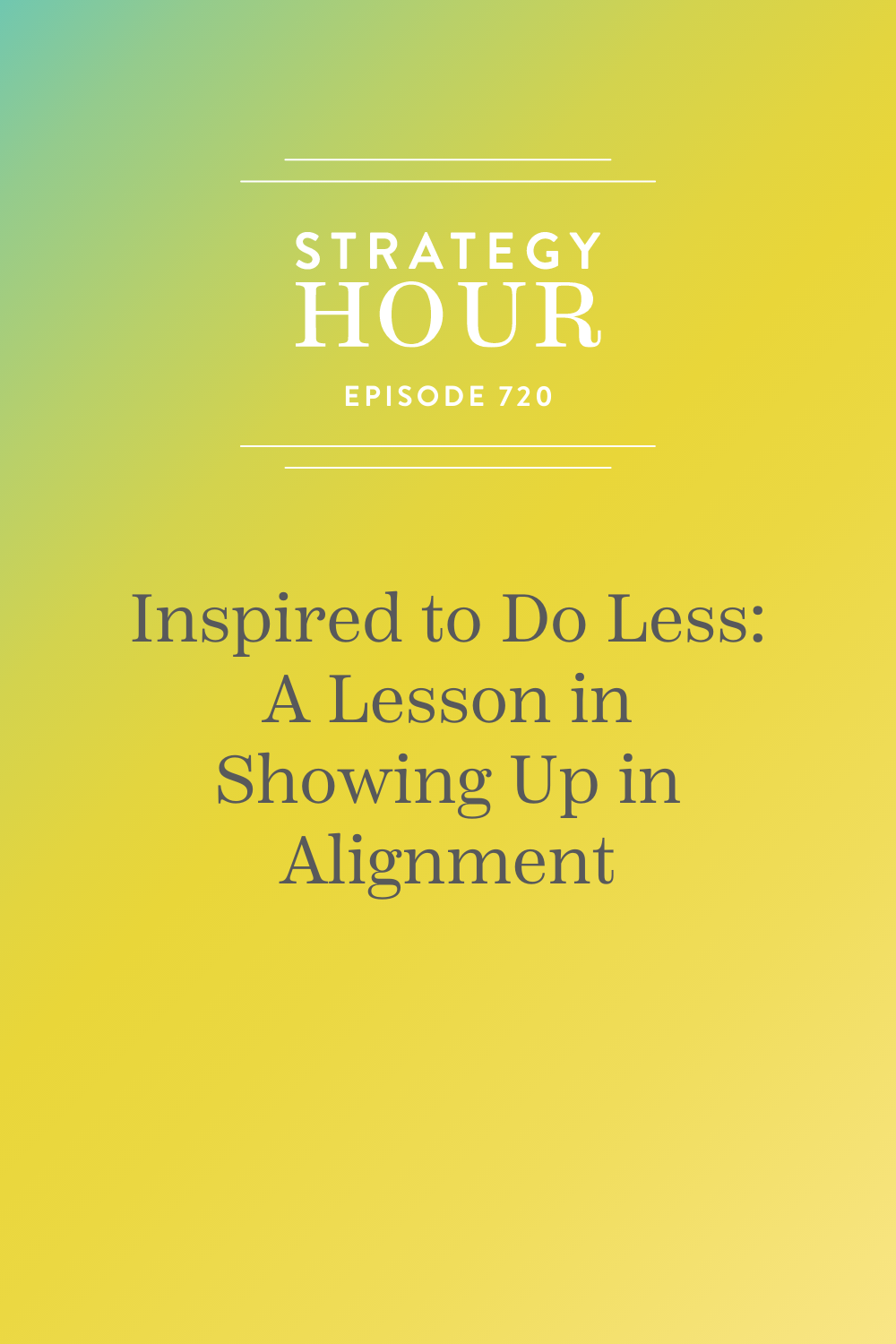Inspired to Do Less: A Lesson in Showing Up in Alignment
Episode 720: Show Notes
How to live more and do less is one of our favorite topics of conversation. If you’re a natural people pleaser, it can be really hard to consider taking some things off of your to-do list. But people-pleasing can be rooted in a manipulative reflex. It can also be a trauma response. During the conference that Abagail recently attended, she heard from three speakers with one underlying message-- do less!
While this sounds counterintuitive, it's something we truly believe, and we want to share some of the nuggets of wisdom that helped us to prioritize this in our own lives, within a productivity-obsessed culture. Three inspiring speakers shared very different insights from their own personal journeys and the research they have done to understand the lives of others. Today, we’re sharing them with you.
Highlights from Cece Jones Davis and Kaitlin B. Curtice
When you feel called, you do not need to be limited by what other people think you should do, or how you should show up. You get to decide how you should show up. The first speaker of the conference has a special gift of making her listeners really think about how they are showing up in the world. She is a justice advocate who has dedicated a lot of time to working with various groups as well as creating her own, to help free wrongfully accused prisoners. If social justice is something that you feel at all called into, Cece is doing so much and you can absolutely learn from her.
Kaitlin B. Curtice offered her insights on what it is like to be indigenous in a world full of white supremacy. She shared her wisdom on how to continue showing up for yourself and your environment, talked about self-care, the caring of others, and specifically, caring for the earth. If you are a person who feels connected to the spiritual world, and you’re religious, but you feel that those things are in conflict with each other, there’s a lot you can learn about reconciling these two things from Kaitlin. She recommended creating a journal to Mother Earth, suggested researching your food, encouraged talking to your houseplants, and made us aware of the power of researching colonization.
The one part of Dr Kate Bowler’s talk that was most impactful
Dr. Kate Bowler experienced a life-altering event a few years ago, when she suddenly realized something was wrong and found out that she had Stage 4 Cancer. She’s got podcasts, she’s got a series of books, she’s got a ton of content on her Instagram. There are plenty of ways for you to connect to that. But there’s one part of her talk that was most impactful for us. She talked about being a human that lives life on a spectrum. The spectrum is from feeling engaged and inspired and empowered, to complete fragility.
The toxic rhetoric around being so independent that it isolates you is capitalism, baby! It doesn’t serve you. Those feelings on the top end inspire many of us to become business owners. And it’s likely that we’ve all felt the other end of the spectrum too. She talked about this collective place that we are all in after the pandemic, where we keep anticipating our ‘before’. We’re never going to go back to who we were before the pandemic. We’re not the same person.
Why superhuman anthropology is a bad influence on humans.
Our society is so focused on self-improvement and self-betterment that they had to pull that genre out of the New York Times best-seller list, because every other non-fiction book would not stand a chance to rank. Superhuman anthropology dominates the discourse – who could we be? What is our potential? Dr. Bowler had hoped to see this aspect of our culture settle down after the pandemic, but she’s been continually disappointed by what’s been released. You can just be. You are inherently enough. We want to focus on how you can handle where you are right now without having to change.
It was refreshing to be in a room where the takeaway for everyone was, how can I let some things go and just be? How can we learn to be content where we are right now with our current resources and our current access? What are the limitations you can create in your life to keep your battery full and not become drained?
The biggest thing that’s helped us to actually do less
It’s so powerful to honor what you know you are going to need. Looking ahead and predicting what environment you will need is a game-changer. The biggest thing that’s helped Emylee to truly do less is a simple practice. That is, releasing the expectations for the type of person you think you need to be, but you don’t actually need to be. It takes some time. That’s something we’re still practicing, especially if you’re a people pleaser.
In both life and business, sometimes you just need to let some things go. They’re so interconnected. Let this be your collective permission to do that. You are a whole person that has a lot going on. We want to support you as you do that. We’d love to hear from you, what resonated with you, what you’re going to put into action, and how you’re going to reconnect with what you want. Send us a DM on Instagram, or if you’re looking for guidance, fill out our form here.
Quote This
When you feel called, you do not need to be limited by what other people think you should do, or how you should show up.
Highlights
Highlights from Cece Jones Davis and Kaitlin B. Curtice [0:12:40]
The one part of Dr Kate Bowler’s talk that was most impactful [0:23:38]
Why superhuman anthropology is a bad influence on humans [0:34:43]
The biggest thing that’s helped us to actually do less [0:44:38]
Today’s Guest:
Abagail & Emylee
The Strategy Hour Podcast
The Strategy Hour Podcast is a twice weekly show hosted by Abagail Pumphrey and Emylee Williams, the founders of Boss Project. Join us for semi-ranty biz conversations for service providers looking to ethically grow their agency businesses. Episodes cover everything from lead generation to leadership mindset to team culture and beyond.
Key Topics:
Productivity, Culture, Time management, Balance, Peer pressure, Motivation, Doing less




